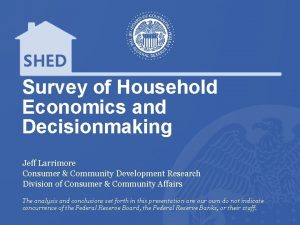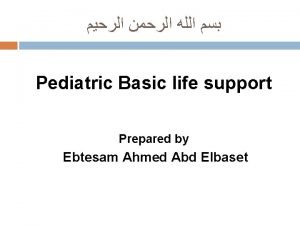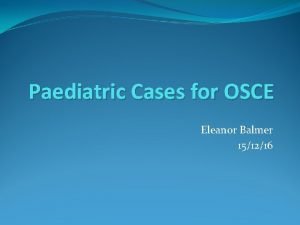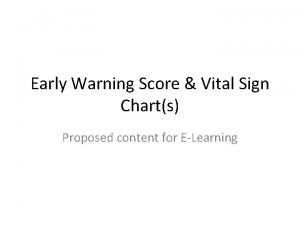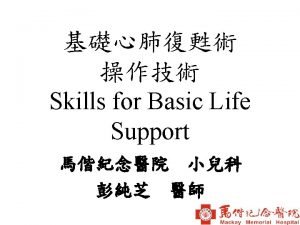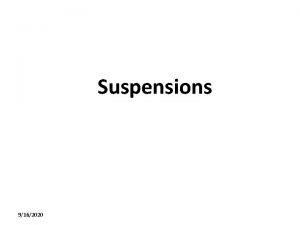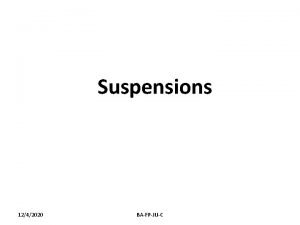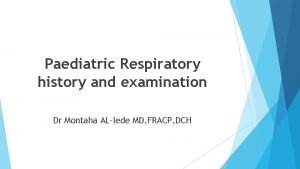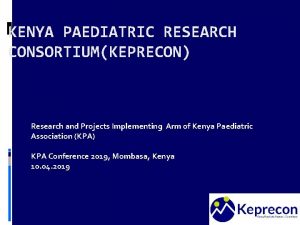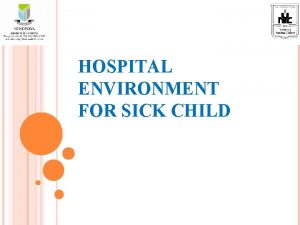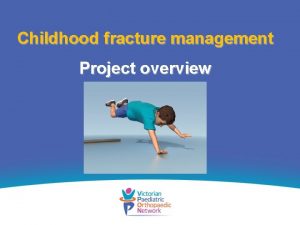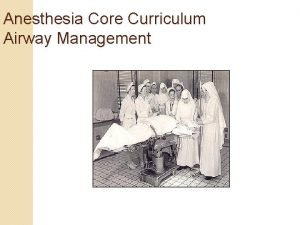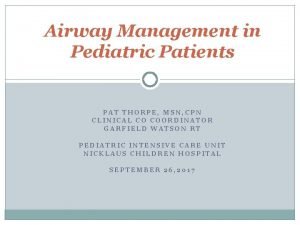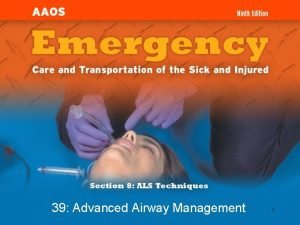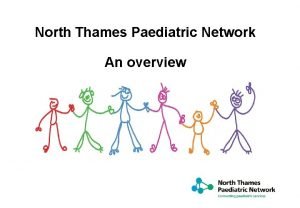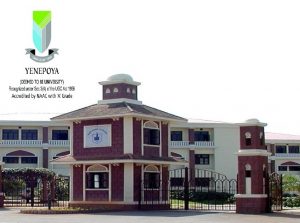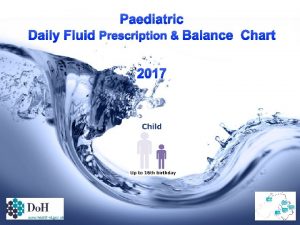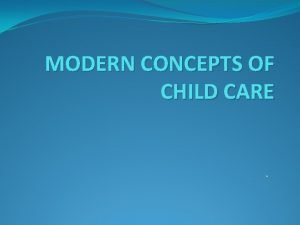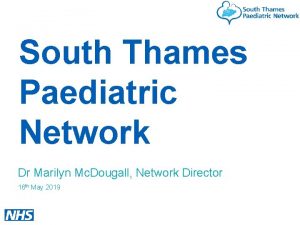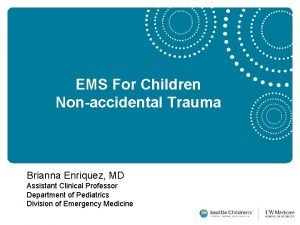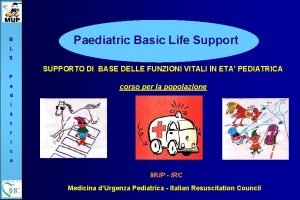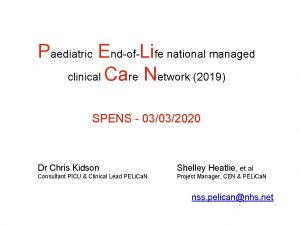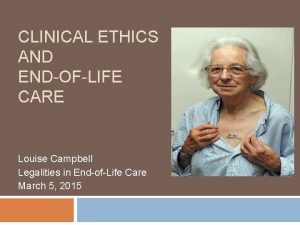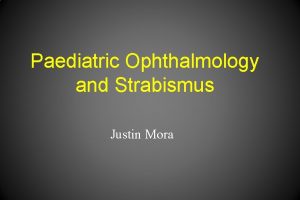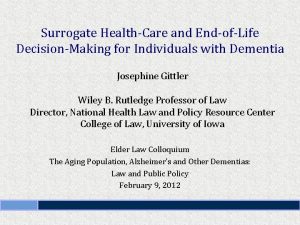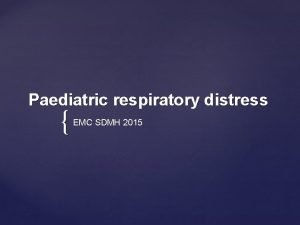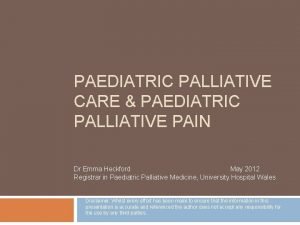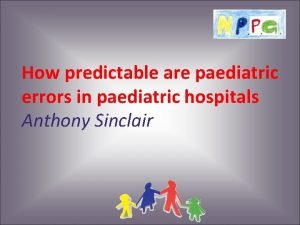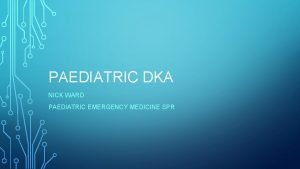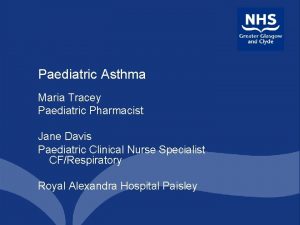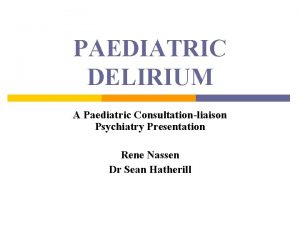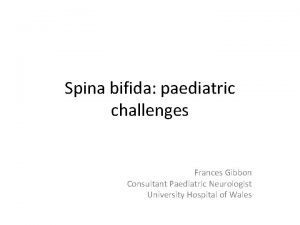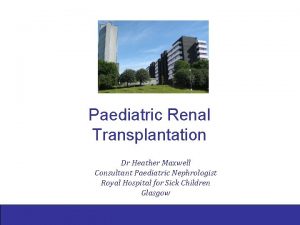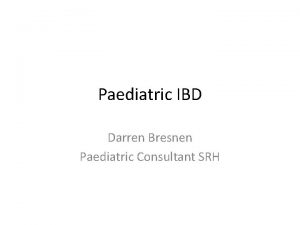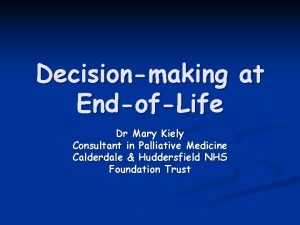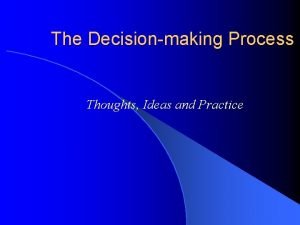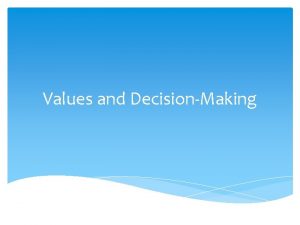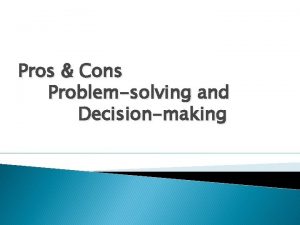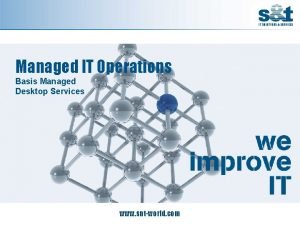Ethics and Decisionmaking Paediatric EndofLife national managed clinical




![Best interests (case law) Dame Butler Sloss (Re A 2000): ‘best interests [test] encompasses Best interests (case law) Dame Butler Sloss (Re A 2000): ‘best interests [test] encompasses](https://slidetodoc.com/presentation_image_h2/37499e468e69e2e5a47400498062e6ee/image-5.jpg)


















- Slides: 23

Ethics and Decision-making Paediatric End-of-Life national managed clinical Care Network) (2019) CENS - 27/02/2020 Dr Chris Kidson Shelley Heatlie, et al Consultant PICU & Clinical Lead PELi. Ca. N Project Manager, CEN & PELi. Ca. N nss. pelican@nhs. net

Prima facie moral rules Hippocrates: ‘To do away with the sufferings of the sick, to lessen the violence of disease and to refuse to treat those who are overmastered by their disease’ Mason and Laurie 2006: ‘The preservation of life is secondary to that of preventing suffering. ’ 2

Ethical Principles underpin ‘best medical practice’ traditional Beneficence - qualify and quantify, and achieve an artificial threshold? (utilitarianism - maximising ‘happiness’) Non-Maleficence - but for a greater foreseeable good? (Kant challenges ‘means to an end’) … what of altruistic donation? Autonomy - self-determination - not applicable to the incompetent minor Justice - resources / finances (time) - to whom? Political 3

Ethical Principles underpin ‘best medical practice’ contemporary • Best interests … (but illogical as only one ‘Best’, therefore ‘Quality of life’ assertions) • Parental authority • Permitted actions • Positive act of ‘Commission’ and ‘Omission’ 4
![Best interests case law Dame Butler Sloss Re A 2000 best interests test encompasses Best interests (case law) Dame Butler Sloss (Re A 2000): ‘best interests [test] encompasses](https://slidetodoc.com/presentation_image_h2/37499e468e69e2e5a47400498062e6ee/image-5.jpg)
Best interests (case law) Dame Butler Sloss (Re A 2000): ‘best interests [test] encompasses medical, emotional and all other welfare issues’. Thorpe LJ (Re S 2001): ‘it would be undesirable and probably impossible to set bounds to what is relevant to a welfare determination’ and that ‘the infinite variety of the human condition … defeats any attempt to be more precise in a definition of best interests … but [allows] attempts at illumination’. 5

Best interests (case law) Ward J (Re A (conjoined twins) 2001): ‘the analytical problem is to determine what may, and what may not, be placed in each scale and what weight is then to be given to each of the factors in the scales’ 6

But weighting is not equal … conscious awareness Holman J (2006): ’No court has yet been asked to approve that against the will of the child’s parents, life support may be withdrawn or discontinued, with the predictable inevitable and immediate death of a conscious child with sensory awareness and assumed normal cognition’ … ‘with the single more important source of pleasure and emotion to a small child, his relationship with his parents and family’. 7

Neurological significance … Cognitive disability more weight than physical disability • Mental impairment may … threaten the sense of … self identity. It is likely that incompetent minors will be disadvantaged by unsubstantiated assumptions made by able bodied adults. • Donaldson J (Re C): ‘intellectual function [is the] hallmark of our humanity’ • Harris (2005): personhood philosophy (the potential for a person to value its own [continued] existence). 8

Physical disabilities The negative reflection: • We talk of difficulties / disabilities, not capabilities (wrapped in a ‘quality of life’ assertion) Baseline function (risks negative discrimination by able bodied adults) +/- acquired morbidity 9

Mental and physical injury Mason and Laurie: Do we want a society in which the right to life depends upon achieving a norm which is largely measured in material terms? Glover (1990): life and consciousness are needed to experience a ‘life worth living’ 10

How much burden is acceptable? (saving the liveable life) An organ-specific burden (neuro-cognition) • Mc. Lean: ‘fallacy of believing that we can take our own life experiences [project our personal response to an altered (uncertain) future] and translate them into someone else’s reality’ • Lord Donaldson: ‘the decision can only be made in the context of the disabled person viewing the worthwhileness or otherwise of his life in its own context as a disabled person’ A cumulative multi-system burden An ability to ‘overcome’ the burden 11

Internal reflection? Has anyone considered that a life may be so burdensome or that the ability to enjoy life’s positive experiences are so remote that a patient may actually be benefited from their death? - Templeman (1991) suggested there might be. • Paradox – severe cognitive disability or depressed level of consciousness – the patient may not be aware of their disadvantage • CK: Is there an ethical difference between a function that has previously been mastered and is lost to one that has never been acquired? Do we perceive a loss to be a greater affliction and viewed with greater scepticism - even though the end result is the same? 12

Making difficult decisions CK: How much objective evidence is needed to inform a subjective value-laden judgements? • How much hierarchical authority is awarded to the tenet, and the person stating their opinion? • Who can decide on which tenet - level of expertise? CK: ‘inherent to our decisions is the fact that we accept the risks on behalf of our patients but do not have to life with the burden of their consequences’. 13

Proxy-decision-makers … CK: Balance a ‘guess’ at what the child would have chosen for themselves with what is an acceptable treatment burden to impose upon the child. Extremes of outcomes: • Get it right: save a life that can be experienced • Get it wrong: burden / harmful / existing, not living; how much cumulative dependency upon invasive procedures and dependency upon medical technology? 14

Why are we frightened…to say ‘no’? Bias to intervene - death is not an acceptable outcome but an absolute loss and a failure to do good Philosophical: Failure to respect ‘the sanctity of life’ • Do we not offer more respect to the sanctity of life if we award value in being able to live the life? 15

But who has authority to decide? Munby 2004: ‘Doctors can properly claim expertise on medical matters but they can claim no special expertise on the many nonmedical matters which go to form the basis of any decision as to what is in a patient’s best interests’ Holman MB, 2008 …ethical decisions… ‘must be made by the doctors [as] judges are neither qualified, nor required, nor entitled to make’ of the best interests test, to include, ‘every kind of consideration capable of impacting on the decision. . . medical, emotional, sensory (pleasure, pain and suffering) and instinctive’. 16

Do the parents have the authority? How able are parent’s to make such profound, life long decisions? Lord Templeman (Re B 1981): While ‘great weight ought to be given to [parental] views’, the shock of learning of the diagnosis would have had an impact on their decision-making abilities. Waite J (1997): ‘The greater the scope for genuine debate … the stronger will be the inclination of the court to be influenced by … the best interests of the child … will be taken by the parent to whom its care has been entrusted by nature’. 17

But … Dame Butler Sloss (Re MB 2008): ‘The graver the consequences of a decision, the commensurately greater the level of competence is required to make the decision’ …Competence may be affected by confusion, shock, pain, fear, drugs…(+ fatigue? !) Is it correct to award the parents greater authority the greater the impact of the decision, especially when their decision-making capabilities may be detrimentally affected? 18

The value of parental views Prof Myra B-L 2007: ‘Parents choose options with infinitesimal odds because the prize they sought was of immeasurable worth’ … But how do they know that they are going to be able to cope (innocent siblings) So we need to discuss with parents when not temporarily rendered incompetent with emotional stress of acute life threatening crisis 19

The value of the ACP and CYPADM forms Pensive reflection out-with acute emotional trauma with a trusted healthcare professional For the receiving doctor in a crisis: ✴ A life-limiting diagnosis is acknowledged ✴ A discussion has occurred ✴ A plan has been formulated ✴ A responsible healthcare professional can be identified 20

My Approach • Seek objective evidence to demonstrate positive interactions, rather than negative experiences (video-clips? ) • Justify the intended treatment - reduce symptoms and prolong life - ‘does the end justify the means’ (although Kant would disapprove) • Consider the ultimate gains - conscious awareness: what does the patient gain from being alive; what positive virtues does the family gain from the patient being alive?

CEC Summary: Risks (harms) ‘v’ benefits (value) + healthcare economic evaluation Cumulative consideration of: • anticipated disease progression • the burden of treatment to achieve the intended outcome • the likelihood of treatment success • the foreseen consequences to jeopardise the goal • the opinions of the child’s advocates (parents and AHPs) - what would the child choose for themselves? ) 22

The Legacy Hedley J (Wyatt 2004): ‘I prefer to determine … what is the best that can be done’ … ‘baby’s best interests required a ‘good death … not under anaesthetic, not in the course of painful and futile treatment, but peacefully in the arms of those who love her the most’. Prof Craft 2011: ‘Death with dignity in an inevitable situation can be thwarted by aggressive attempts to save life’ 23
 Survey of household economics and decisionmaking
Survey of household economics and decisionmaking Macro and micro ethics
Macro and micro ethics Pediatric pat
Pediatric pat Pc hpc pmh
Pc hpc pmh Pews chart 0-11 months
Pews chart 0-11 months Child health nursing definition
Child health nursing definition Decardron
Decardron Paediatric chalk mixture bpc
Paediatric chalk mixture bpc Calamine lotion preparation
Calamine lotion preparation Paediatric respiratory history
Paediatric respiratory history Kenya paediatric research consortium
Kenya paediatric research consortium Hospital environment for sick child definition
Hospital environment for sick child definition Rch supracondylar fracture
Rch supracondylar fracture Paediatric et tube size formula
Paediatric et tube size formula Paediatric et tube size formula
Paediatric et tube size formula Paediatric et tube size formula
Paediatric et tube size formula North thames paediatric network
North thames paediatric network Modern concept of child health care ppt
Modern concept of child health care ppt Fluid prescription chart
Fluid prescription chart Modern concept in child health care
Modern concept in child health care South thames paediatric network
South thames paediatric network Pediatric pat
Pediatric pat Calculate drops per minute
Calculate drops per minute Azioni blsp
Azioni blsp
